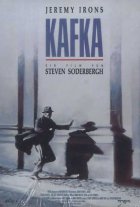
Kafka Page #8
- PG-13
- Year:
- 1991
- 98 min
- 697 Views
KAFKA:
(sighs at her
relentlessness)
Now you've fallen into his trap.
When he goes to bed at night
Burgel dreams of inspiring as much
fear in others as they inspire in
him.
GABRIELA:
understand suicide, isn't it.
She's got his number. He's so in awe of her he has to turn
away -- looking out the room's small window.
KAFKA:
always used to call it the approach
road for suicides. It leads
straight down to the bridge and
the River.
GABRIELA:
Burgel hated Eduard. And me. I'm
sure he knew about us -- and I'm
sure it drove him mad.
KAFKA:
Burgel doesn't like anybody!
GABRIELA:
He used to like me -- very much
more than I liked him.
KAFKA:
He's jealous, yes, but that
jealous? He's too cautious.
Gabriela clears some more items off a mantelpiece with a
sweeping gesture.
GABRIELA:
Of course he is -- the Castle
precincts are not the safest part
of the city after dark. People
disappear up there regularly. If
you want to lie in wait for someone,
that's the place to do it.
KAFKA:
Now you're saying Eduard was lured
there?
GABRIELA:
(puts away the last
few books)
How often does one of our clerks
have business in the house of records?
KAFKA:
I've heard of it happening.
GABRIELA:
messages, isn't he?
KAFKA:
Usually.
Putting the bag down, Gabriela goes closer to Kafka, so close
he almost cowers.
GABRIELA:
Or what if there really was an
error? -- I don't know what kind --
any kind that needed correcting --
and what if Burgel was responsible
for it? One mistake -- even a small
one in a firm like ours -- it could
cost him a promotion.
KAFKA:
First these nameless authorities
were the root of all evil, now it's
insignificant Burgel. If indeed
there was a mistake -- and a minor
one at that -- you're suggesting
someone went to a lot of trouble
over something so trivial as to
not matter at all.
GABRIELA:
people is not determined by the
amount of work it entails -- you're
far from understanding the
authorities if you believe that.
KAFKA:
Now Burgel's one of the authorities?
She turns away from him, reddening.
GABRIELA:
For all his big talk he is. Does
he really have access to the Directors
of the firm as he always claims? --
or only the Deputy Managers -- people
of no importance whatsoever. Someone
ought to follow him for a change.
Kafka sees an opportunity to go to her, to try to calm her,
to make a timid approach to this woman.
KAFKA:
You won't make any sense of it
while you're upset.
-- But she breaks away.
GABRIELA:
Burgel is only there for one
purpose -- to spy on the employees
and report any and all indiscretions,
real or imagined. If he didn't
send Eduard to the Castle, you can
be damn sure he's in league with
whoever greeted him there.
(very upset now)
All those bastards are in league
with each other -- why can't you
see that!
She takes hold of him as if to shake some sense into him --
but really because she needs someone to hold.
KAFKA:
... I don't see anything. I see
a message on its way to me -- with
all the right answers. Only it
never arrives -- it's always just
on its way.
Gabriela doesn't seem to be listening. She's looking around.
the little room, as if it's someone else she's holding ...
GABRIELA:
Eduard ...
Her head against his, Kafka tentatively touches her hair
and she pulls away, the spell broken.
GABRIELA:
Your ignorance of the way things
are here is so appalling that it
makes my head spin to listen to
you and compare what you say and
have in mind with the real situation!
She storms out, vehemently picking up her bag on the way out,
and slamming the door quakingly behind her.
Kafka is too astonished at her behavior to make a move for a
moment, then he glances at the bomb-case she's left behind,
then he goes out to the landing.
GABRIELA:
Rushing down the stairs in anger, tearing open the door at
the middle landing and slamming that one too once past it.
KAFKA:
Following her down.
GABRIELA:
Coming down the final flight of stairs, disappearing through
the door at the bottom, slamming that one as well.
KAFKA:
Almost caught up with her, coming down to the last door.
GROUND FLOOR HALLWAY
Kafka comes through the door from the stairs, out of breath,
and stops. He's too late. The hallway is empty. The front
door at the end of it is shut. He makes a face and a moment
later starts to go back up. Then stops again. Turns. Looks
back at the front door. ... The one he didn't hear slam.
OUTSIDE:
The front door opens and Kafka steps out. He stands on the
stoop. He looks up the street one way. Deserted. He looks
down the street the other way. Deserted.
CUT:
INSIDE - DAY
Kafka leads the police Inspector back along the lodging house
hallway. The two subordinate policemen follow behind.
INSPECTOR:
You said she was extremely upset.
People who are extremely upset --
Kafka -- are given to disappearing
in a hurry. They go and calm down
for a day or so and then they come
back.
They've come to the door to the stairs now.
KAFKA:
But that's just my point -- she was
more than upset, she was livid.
She slammed every door on her way
downstairs -- except that one.
(points at front door)
I was just behind her and I didn't
even hear that one shut -- not at
all.
INSPECTOR:
That's not what I call conclusive
evidence of an abduction.
KAFKA:
If someone was waiting here in the
hallway to spirit her away, wouldn't
they have shut the door as quietly
as possible?
The Inspector stares at him. The two other policemen roll
their eyes at each other.
CUT:
EDUARD'S ROOM
Kafka keeps his eye on the two policemen as they poke around,
one of them getting close to the dumbwaiter.
INSPECTOR:
Why would someone want to kidnap
this woman -- the name is Rossmann?
He says it rather derisively, separating the syllables of the
name.
KAFKA:
You told me to contact you if
anything relevant came up --
Gabriela is relevant. When I
spoke to you before I didn't know
she'd been seeing Eduard.
INSPECTOR:
That's been noted. But where
does it lead us? Unless you have
something more to add.
KAFKA:
She's missing. I went to her house
and she hadn't returned there.
The policeman at the dumbwaiter peers down the shaft -- but
then moves on.
INSPECTOR:
She lost her job today. Just
between you and me, I'd probably
go away and brood a bit myself.
He signals his men, time for them to go.
STAIRWAY:
The two Policemen lead the way back down, the Inspector
behind them, Kafka remaining on the top landing.
KAFKA:
(manages to blurt out)
Maybe it's true then what she said.
INSPECTOR:
(pauses)
What did she say?
KAFKA:
That the police may have allegiance
to something other than truth.
The two other policemen look at each other ominously. The
Inspector turns to them, giving them a look, and they go off
down the stairs. The Inspector plods back up to Kafka Like a
stern parent.
Translation
Translate and read this script in other languages:
Select another language:
- - Select -
- 简体中文 (Chinese - Simplified)
- 繁體中文 (Chinese - Traditional)
- Español (Spanish)
- Esperanto (Esperanto)
- 日本語 (Japanese)
- Português (Portuguese)
- Deutsch (German)
- العربية (Arabic)
- Français (French)
- Русский (Russian)
- ಕನ್ನಡ (Kannada)
- 한국어 (Korean)
- עברית (Hebrew)
- Gaeilge (Irish)
- Українська (Ukrainian)
- اردو (Urdu)
- Magyar (Hungarian)
- मानक हिन्दी (Hindi)
- Indonesia (Indonesian)
- Italiano (Italian)
- தமிழ் (Tamil)
- Türkçe (Turkish)
- తెలుగు (Telugu)
- ภาษาไทย (Thai)
- Tiếng Việt (Vietnamese)
- Čeština (Czech)
- Polski (Polish)
- Bahasa Indonesia (Indonesian)
- Românește (Romanian)
- Nederlands (Dutch)
- Ελληνικά (Greek)
- Latinum (Latin)
- Svenska (Swedish)
- Dansk (Danish)
- Suomi (Finnish)
- فارسی (Persian)
- ייִדיש (Yiddish)
- հայերեն (Armenian)
- Norsk (Norwegian)
- English (English)
Citation
Use the citation below to add this screenplay to your bibliography:
Style:MLAChicagoAPA
"Kafka" Scripts.com. STANDS4 LLC, 2024. Web. 7 Nov. 2024. <https://www.scripts.com/script/kafka_883>.



Discuss this script with the community:
Report Comment
We're doing our best to make sure our content is useful, accurate and safe.
If by any chance you spot an inappropriate comment while navigating through our website please use this form to let us know, and we'll take care of it shortly.
Attachment
You need to be logged in to favorite.
Log In